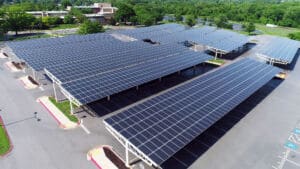 The transition to renewable energy has often been driven by government entities and electrical utilities due to their direct influence over energy policy and their direct access to electricity distribution. These entities have legislated renewable energy goals & policy mandating a % of the state or utility’s electricity comes from renewable sources. Lately, corporations have begun using their influence and resources to drive renewable energy goals forward. Corporations like Microsoft, Google, and Facebook have pledged to be carbon neutral by set dates in the future, but it’s not just big tech driving renewables. Perhaps the most surprising announcement came from oil giant BP who pledged carbon neutrality by 2050. A remarkable goal for a company whose current business model is built on fossil fuels, and one that will require a dramatic shift in operations. These aren’t just catchy headlines meant to generate a positive PR, but rather a realization that companies can influence the transition to renewable energy through their own actions instead of waiting for new energy policies to be legislated. It’s also a realization that in order to ensure the future health and success of their respective businesses, they need a healthy environment for themselves, their employees, and their customers.
The transition to renewable energy has often been driven by government entities and electrical utilities due to their direct influence over energy policy and their direct access to electricity distribution. These entities have legislated renewable energy goals & policy mandating a % of the state or utility’s electricity comes from renewable sources. Lately, corporations have begun using their influence and resources to drive renewable energy goals forward. Corporations like Microsoft, Google, and Facebook have pledged to be carbon neutral by set dates in the future, but it’s not just big tech driving renewables. Perhaps the most surprising announcement came from oil giant BP who pledged carbon neutrality by 2050. A remarkable goal for a company whose current business model is built on fossil fuels, and one that will require a dramatic shift in operations. These aren’t just catchy headlines meant to generate a positive PR, but rather a realization that companies can influence the transition to renewable energy through their own actions instead of waiting for new energy policies to be legislated. It’s also a realization that in order to ensure the future health and success of their respective businesses, they need a healthy environment for themselves, their employees, and their customers.
One of the most attainable and impactful ways these companies are making strides toward their goals is by powering on-site operations with solar energy. Frequently a solar power purchase agreement (PPA) is used as the method of financing these projects on site. This method allows companies to invest in solar without requiring any upfront cash to be invested while realizing immediate electricity savings. Additionally, companies can benefit from economies of scale by including multiple sites into one PPA to increase savings at each location and move closer to meeting their sustainability goals. A great example of this is Target, whose large retail spaces with flat roofs make them ideal solar candidates. They recently reached 500 stores across the country powered by solar; a goal initially set back in 2015. By bundling multiple stores within the same markets, Target leveraged multi-site solar PPAs to attain this lofty goal in just five years.
 Google has been another innovative corporation, finding ways to leverage solar and meet its’ goal of powering operations 24/7 with carbon-free energy by 2030. This goal will require both solar energy and energy storage; they’ve used power purchase agreements in innovative ways to reach this goal over the past decade, notably when signing deals with utilities to power Google’s data centers. They have taken the approach of building power plants, often offsite, and selling energy back to the local utility rather than using it behind its’ own electric meter. This method allows the company to build out solar on a massive scale. Simultaneously, the power from the project is distributed to homes and businesses throughout the area via the electric utility. This has led to almost 250MW of solar development by Google through the end of 2019.
Google has been another innovative corporation, finding ways to leverage solar and meet its’ goal of powering operations 24/7 with carbon-free energy by 2030. This goal will require both solar energy and energy storage; they’ve used power purchase agreements in innovative ways to reach this goal over the past decade, notably when signing deals with utilities to power Google’s data centers. They have taken the approach of building power plants, often offsite, and selling energy back to the local utility rather than using it behind its’ own electric meter. This method allows the company to build out solar on a massive scale. Simultaneously, the power from the project is distributed to homes and businesses throughout the area via the electric utility. This has led to almost 250MW of solar development by Google through the end of 2019.
Other than the substantial electrical savings, what other benefits drive these companies to make such significant solar investments? The answers vary from company to company, but across the board, it’s clear that this isn’t being done just for a quick PR boost for the brand. Microsoft has stated that its’ pledge to become carbon negative by 2050 was partly driven by its employees’ desire to see the corporation step up and address this vital issue. Renewable goals are also expected to help draw talent from prospective employees who want a workplace that shares their values. Companies also realize that public opinion is on their side, and 100% renewables pledges have been well received by their customers. Recent research by Malansky & Partners in a national study found that 70% of people believed in transitioning to 100% renewables like solar and wind.
 Companies of different sizes and across various industries and regions have all realized the positive benefits of making 100% renewable pledges. There are currently 260 companies in the RE 100 Index, a membership group for corporations that have committed to this 100% renewable pledge. This once novel idea of corporations driving the transition to renewables has become the norm. Organizations realize the urgency of addressing climate change and the benefits they see from making this transition. Reaching these goals via solar PPAs is often a money-saving initiative and, simultaneously, an excellent gesture for investors, customers, and employees. While government and utilities have often been the drivers of solar adoption in the past, corporations have realized using their own influence and resources on local, national, and global levels can do just as much to ensure a clean energy future for themselves and their customers.
Companies of different sizes and across various industries and regions have all realized the positive benefits of making 100% renewable pledges. There are currently 260 companies in the RE 100 Index, a membership group for corporations that have committed to this 100% renewable pledge. This once novel idea of corporations driving the transition to renewables has become the norm. Organizations realize the urgency of addressing climate change and the benefits they see from making this transition. Reaching these goals via solar PPAs is often a money-saving initiative and, simultaneously, an excellent gesture for investors, customers, and employees. While government and utilities have often been the drivers of solar adoption in the past, corporations have realized using their own influence and resources on local, national, and global levels can do just as much to ensure a clean energy future for themselves and their customers.







